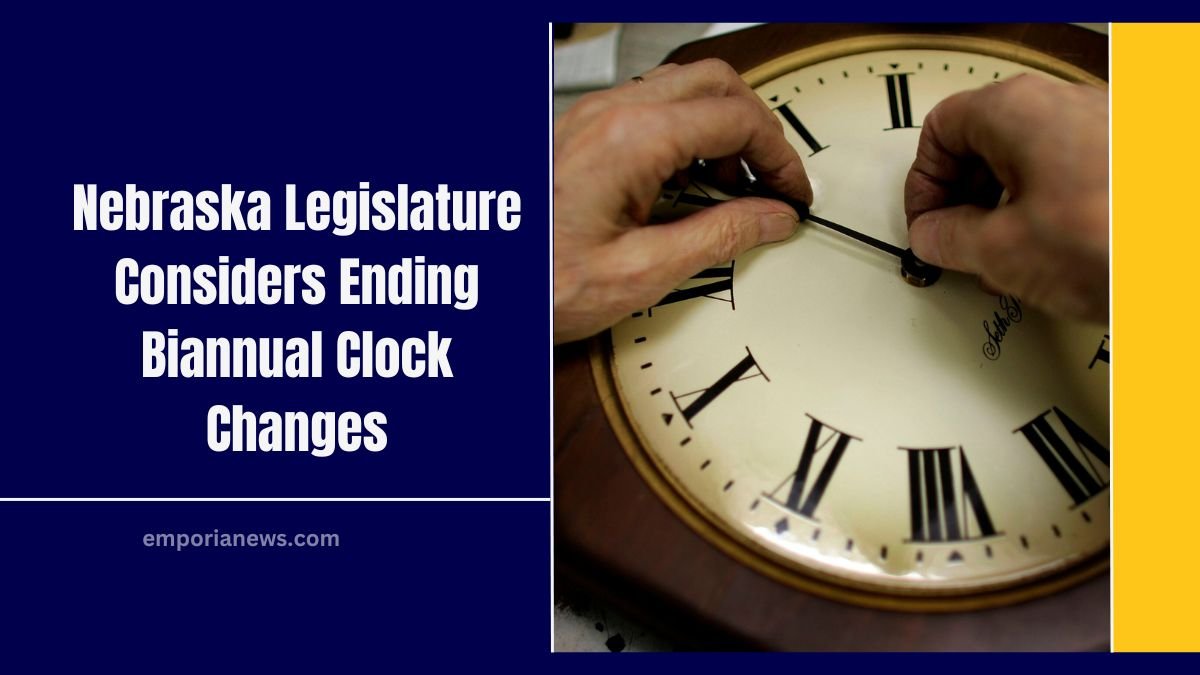The Nebraska Legislature is currently evaluating two distinct bills aimed at abolishing the state’s biannual clock changes.
These proposals advocate for either permanent daylight saving time (DST) or permanent standard time, reflecting a broader national discourse on the subject.
Overview of the Proposed Legislation
The two bills under consideration are:
- Legislative Bill 34 (LB 34): Introduced by State Senator Megan Hunt, this bill proposes the adoption of year-round daylight saving time. This change would result in extended evening daylight, potentially benefiting various economic activities.
- Legislative Bill 302 (LB 302): Sponsored by State Senator Dave Murman, this bill advocates for the implementation of permanent standard time. Supporters highlight health and safety advantages associated with this approach.
Arguments for Permanent Daylight Saving Time
Proponents of LB 34 emphasize several benefits of maintaining daylight saving time throughout the year:
- Economic Enhancement: Extended evening daylight could boost consumer activities such as dining, shopping, and recreational events, thereby stimulating local economies.
- Improved Quality of Life: Longer daylight hours in the evening may encourage outdoor activities and social interactions, contributing to overall well-being.
- Mental Health Benefits: Increased exposure to natural light during evening hours could alleviate symptoms of seasonal affective disorder and other mood-related conditions.
Arguments for Permanent Standard Time
Advocates for LB 302 present compelling reasons for adopting standard time year-round:
- Health Considerations: Aligning waking hours with natural daylight supports circadian rhythms, potentially reducing risks of sleep disorders and associated health issues.
- Safety Improvements: Brighter mornings can enhance visibility for commuters and schoolchildren, potentially decreasing the likelihood of accidents.
- Medical Endorsements: Organizations such as the American Academy of Sleep Medicine and the American Medical Association have expressed support for permanent standard time due to its health benefits.
Regional Coordination and Implementation
The enactment of either bill is contingent upon regional collaboration:
- LB 34: Requires at least three neighboring states to adopt year-round daylight saving time before implementation in Nebraska.
- LB 302: Necessitates that Iowa, Kansas, South Dakota, and Wyoming enact legislation for permanent standard time prior to Nebraska’s adoption.
This regional approach aims to prevent time disparities that could disrupt commerce and daily life.
National Context and Federal Considerations
The debate in Nebraska mirrors a national conversation on time observance:
- Federal Regulations: Current U.S. law prohibits states from unilaterally adopting permanent daylight saving time but permits the observance of permanent standard time.
- State Initiatives: Several states have passed legislation favoring permanent daylight saving time, pending federal approval. Conversely, states like Arizona and Hawaii have long observed permanent standard time.
Potential Impacts on Nebraska Residents
The decision to adopt either permanent daylight saving time or standard time carries various implications:
- Economic Effects: Extended evening daylight could benefit sectors such as retail and entertainment, while consistent time observance may reduce operational complexities for businesses.
- Health and Well-being: Aligning daily schedules with natural light cycles can influence sleep patterns, mood, and overall health.
- Educational Considerations: Morning light affects students’ safety and alertness during early school hours.
Summary of Legislative Proposals
The following table outlines key aspects of the two legislative bills:
| Bill Number | Proposed Time Standard | Primary Advocate | Key Benefits | Implementation Requirement |
|---|---|---|---|---|
| LB 34 | Permanent Daylight Saving | Sen. Megan Hunt | Economic growth, enhanced evening activities, potential mental health benefits | Adoption by three neighboring states |
| LB 302 | Permanent Standard Time | Sen. Dave Murman | Health and safety improvements, alignment with natural circadian rhythms | Legislative approval from Iowa, Kansas, South Dakota, and Wyoming |
As Nebraska lawmakers deliberate on these competing proposals, the outcome will significantly influence the state’s alignment with natural light cycles, economic activities, and residents’ daily routines.
The decision will also reflect broader regional and national trends concerning time observance practices.
SEO Meta Description: Nebraska Legislature debates bills proposing permanent daylight saving or standard time to end biannual clock changes.




